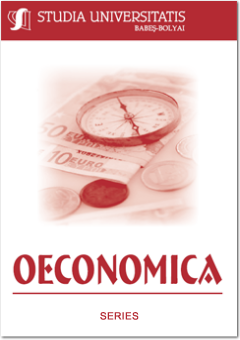A CAUSALITY ANALYSIS OF THE RELATIONSHIPS BETWEEN GROSS FIXED CAPITAL FORMATION, ECONOMIC GROWTH AND EMPLOYMENT IN SOUTH AFRICA
A CAUSALITY ANALYSIS OF THE RELATIONSHIPS BETWEEN GROSS FIXED CAPITAL FORMATION, ECONOMIC GROWTH AND EMPLOYMENT IN SOUTH AFRICA
Author(s): Daniel Francois Meyer, Kazeem Abimbola SanusiSubject(s): Economy, Supranational / Global Economy, Business Economy / Management, Energy and Environmental Studies, Financial Markets, Marketing / Advertising, Human Resources in Economy, Business Ethics
Published by: Studia Universitatis Babes-Bolyai
Keywords: Domestic investment; economic growth; employment; Granger causality; South Africa;
Summary/Abstract: In terms of macro-economic policy, gross fixed capital formation, which is the major component of domestic investment, is seen as an important process that could accelerate economic growth. This study re-examines the controversial issue of causality between domestic investment, employment and economic growth using South African data. The traditional assumption of causality running from investment to economic growth has remained inconclusive while empirical findings on the investment and employment growth nexus are also largely unsettled. The study makes use of quarterly data from 1995Q1 to 2016Q4 within the framework of the Johansen cointegration and Vector Error Correction Models (VECM). The empirical findings suggest that a long run relationship exists between domestic investment, employment and economic growth, with causality running from economic growth to investment and not vice versa. The results also demonstrate that investment has a positive long-run impact on employment. The empirical evidence further suggests bi-directional causality between employment and economic growth, while evidence of uni-directional causality, from investment to employment, is also found. The major implication of the study is that although there is bi-directional causality between economic growth and employment, economic growth does not translate to increased employment in the long run confirming “jobless growth”. Investment is found to be a positive driver of employment in the South African economy in the long-run. The study concludes that, in order to stimulate employment, investment enhancing policies, such as low interest rates and a favourable economic environment should be put in place to accelerate growth. Measures to promote economic growth, such as improved infrastructural facilities and diversification of the economy, should be further engineered so as to encourage increased investment.
Journal: Studia Universitatis Babes Bolyai - Oeconomica
- Issue Year: 64/2019
- Issue No: 1
- Page Range: 33-44
- Page Count: 12
- Language: English

